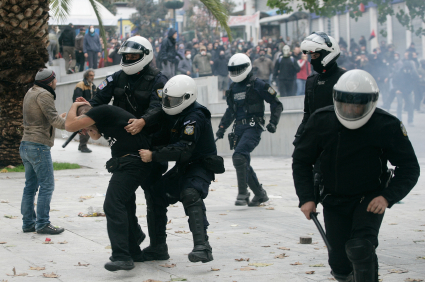Popular opinion in Greece had previously swayed in favour of the Eurozone with the vast majority of citizens voting in favour of remaining in the 17-nation bloc. But since the Greek government announced the plan to reduce minimum wage by 22% and raise the retirement age but reduce the pension pay-out, there has been a snowballing effect in terms of Euro-dissidents. Many Greeks now oppose the Euro and the strict deficit-cutting measures it comes with; the benefits are beginning to pale in comparison to the consequences.
The mood of discontent has been characterised by private and public sector strikes. Following on from Tuesday’s strike a new 48-hour protest has begun today in Athens. Metro stations and buses have come to a halt, ships have remained docked at the capital’s main ports, hospital doctors and bank workers have abandoned their posts, and disgruntled citizens have descended upon and occupied a government ministry.
‘Don’t push me ‘cos I’m close to the edge, I’m trying not to lose my head.’ The chilling chorus sung by the Grandmaster Flash perfectly echoes the Greek situation. After 5 years of recession, belt-tightening, and cutbacks the average Greek citizen finds himself on the brink of poverty.
Crowds scream: “They are crooks and thieves,” victims of the cuts suggest: “Our politicians should live on minimum wage to see what it’s like.” “We want justice,” exclaim a huddle of hospital workers. “They are tearing down our state,” announces a doctor, Iphighenia Kontou: “People can’t get basic healthcare anymore. They want us to pay off our country’s debts at the expense of everything else. Why hasn’t one person gone to prison yet for all the corruption, all the wrongdoing that got us here in the first place?” A compelling question that remains unanswered.
A mechanic explains the thought process behind the ferocity of the latest protests: “For a long time we accepted these measures because we understand that Greece needs change. But they’ve got us nowhere. The middle class is being torn apart. To ask for more when there is no more to cut is foolish and dangerous.”
George Karatzaferis of the Laos party, one third of the governing coalition headed by Lucas Papademos, has announced that he cannot accept the austerity measures that he feels are being forced upon his country: “I will not put up with [Greece] being ridiculed.” The decision has thrown up a dust cloud of confusion over the negotiations and a Greek cabinet meeting has subsequently been delayed; first by two hours and then by twenty-four. The Euro has fallen sharply since the decision amid further fears that the proposal will not be passed.
In a symbolic expression of anger and contempt, Greece’s largest police union has threatened to issue arrest warrants for EU and IMF officials, accusing them of: “blackmail [and] covertly abolishing or eroding democracy and national sovereignty.”
The riots on the streets have erupted from peaceful protests into petroleum fuelled pandemonium; the frantic talks between Greek officials and members of the Troika are not much better. Greece has been pushed into a corner and left with only two choices: accept defeat and surrender democracy; or blow a hole through the firewall and go it alone.



